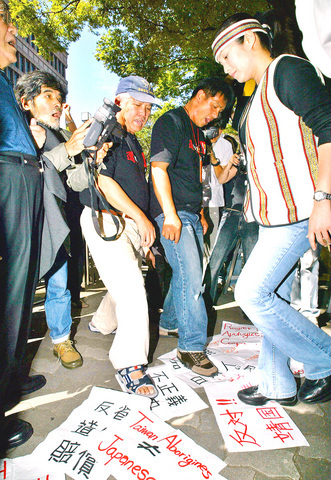A Japanese court yesterday ruled that Prime Minister Junichiro Koizumi violated the Constitution's rules on religion by going to a Tokyo war shrine that critics say glorifies Japan's militarist past. However, the Osaka High Court rejected the Taiwanese plaintiffs' claims to be compensated over the visits.
The panel said that Koizumi's worshipping at the Yasukuni shrine is a public act and therefore violates the constitutional separation of state and religion, a lawyer for the plaintiffs said.
It was not immediately clear whether the ruling had the force to prevent further visits, but plaintiffs and their supporters called the decision a watershed.

PHOTO: AFP
It was the second time in 18 months a court has ruled such visits unconstitutional.
"This is groundbreaking, a landmark ruling," plaintiffs' lawyer Mitsunori Nakajima said from Osaka. "Most important was the recognition that Koizumi's visits were clearly carried out in a public capacity."
Koizumi and other government officials were disappointed.
"I don't understand why my visits to Yasukuni violate the Constitution," Koizumi said at a parliamentary session following the ruling. "I'm paying my respects to those who died in the war, with the conviction that we must never wage such a war again."
"I visit Yasukuni as a private citizen, and as prime minister, but not in a public capacity," he said.
The court rejected compensation demands of ?10,000 (US$88) by each of the 188 plaintiffs, who included Independent Legislator May Chin (高金素梅) and bereaved families of World War II veterans from Taiwan, many of them enshrined at Yasukuni against the families' wishes, according to court spokesman Masaharu Otani.
"We're not satisfied with today's ruling, though it did take one little step forward," Chin said. "We urge the Japanese government to take three or four steps forward," she said.
"The ruling suggested Japan has started to face the fact that emergence of militarism would endanger the humanity," she said in a statement.
"It is regrettable, however," she continued, that, "Japan has yet to face up to its past `monstrous crimes' which it had committed against Taiwan's Aborigines."
It was the second ruling on a lawsuit concerning the shrine in as many days. On Thursday, the Tokyo High Court turned down a similar case and declared Koizumi's visits were private, but it did not rule on the constitutionality of worshipping at Yasukuni.
Koizumi has gone to the shrine four times since becoming prime minister in April 2001.
"These visits go against Article 20 of the Japanese Constitution, which calls for the separation of the state and religion," the ruling read, according to Nakajima.
The court noted that Koizumi visited the shrine with a government secretary and used a state car, and also criticized him for not clearly denying he was on an official visit.
Additional reporting by staff writer

AIR SUPPORT: The Ministry of National Defense thanked the US for the delivery, adding that it was an indicator of the White House’s commitment to the Taiwan Relations Act Deputy Minister of National Defense Po Horng-huei (柏鴻輝) and Representative to the US Alexander Yui on Friday attended a delivery ceremony for the first of Taiwan’s long-awaited 66 F-16C/D Block 70 jets at a Lockheed Martin Corp factory in Greenville, South Carolina. “We are so proud to be the global home of the F-16 and to support Taiwan’s air defense capabilities,” US Representative William Timmons wrote on X, alongside a photograph of Taiwanese and US officials at the event. The F-16C/D Block 70 jets Taiwan ordered have the same capabilities as aircraft that had been upgraded to F-16Vs. The batch of Lockheed Martin

US President Donald Trump yesterday announced sweeping "reciprocal tariffs" on US trading partners, including a 32 percent tax on goods from Taiwan that is set to take effect on Wednesday. At a Rose Garden event, Trump declared a 10 percent baseline tax on imports from all countries, with the White House saying it would take effect on Saturday. Countries with larger trade surpluses with the US would face higher duties beginning on Wednesday, including Taiwan (32 percent), China (34 percent), Japan (24 percent), South Korea (25 percent), Vietnam (46 percent) and Thailand (36 percent). Canada and Mexico, the two largest US trading

GRIDLOCK: The National Fire Agency’s Special Search and Rescue team is on standby to travel to the countries to help out with the rescue effort A powerful earthquake rocked Myanmar and neighboring Thailand yesterday, killing at least three people in Bangkok and burying dozens when a high-rise building under construction collapsed. Footage shared on social media from Myanmar’s second-largest city showed widespread destruction, raising fears that many were trapped under the rubble or killed. The magnitude 7.7 earthquake, with an epicenter near Mandalay in Myanmar, struck at midday and was followed by a strong magnitude 6.4 aftershock. The extent of death, injury and destruction — especially in Myanmar, which is embroiled in a civil war and where information is tightly controlled at the best of times —

China's military today said it began joint army, navy and rocket force exercises around Taiwan to "serve as a stern warning and powerful deterrent against Taiwanese independence," calling President William Lai (賴清德) a "parasite." The exercises come after Lai called Beijing a "foreign hostile force" last month. More than 10 Chinese military ships approached close to Taiwan's 24 nautical mile (44.4km) contiguous zone this morning and Taiwan sent its own warships to respond, two senior Taiwanese officials said. Taiwan has not yet detected any live fire by the Chinese military so far, one of the officials said. The drills took place after US Secretary